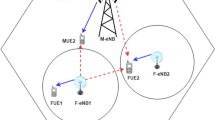Abstract
Channelization codes used in WCDMA are Orthogonal Variable Spreading Factor (OVSF) codes. These codes suffer from code blocking limitation. Many designs are proposed to avoid this limitation but most of them do not consider number of codes searched, which affects call establishment delay prior to handling a call. We propose a fast OVSF code assignment design which aims to reduce number of codes searched with optimal/suboptimal code blocking. The code assignment scheme aims to use those vacant codes whose parents are already blocked. This leads to occurrence of more vacant codes in groups, which ultimately leads to less code blocking for higher rate calls. The number of codes searched increases linearly in our design compare to most of other novel proposed single code methods like crowded first assignment, where it increases exponentially with increase in user rates. Also the calculation of vacant codes at one layer will be sufficient to identify the vacant code adjacency for all the layers which reduces complexity. Simulation results are presented to verify the superiority of the design.
Similar content being viewed by others
References
Adachi, F., Sawahashi, M., & Suda, H. (1998). Wideband DS-CDMA for Next-Generation Mobile Communications Systems. IEEE Communications Magazine, 36, 56–69.
Adachi, F., Sawahashi, M., & Okawa, K. (1997). Tree structured generation of orthogonal spreading codes with different lengths for forward link of DS-CDMA mobile radio. IEE Electronics Letters, 33, 27–28.
Tseng, Y. C., Chao, C. M., & Wu, S. L. (2001). Code placement and replacement strategies for wideband CDMA OVSF code tree management. In Proc. of IEEE GLOBECOM (Vol. 1, pp. 562–566).
Park, J. S., & Lee, D. C. (2003). Enhanced fixed and dynamic code assignment policies for OVSF-CDMA systems. In Proc. of ICWN, Las Vegas (pp. 620–625).
Rouskas, A. N., & Skoutas, D. N. (2005). Management of channelization codes at the forward link of WCDMA. IEEE Communications Letters, 9(8), 679–681.
Saini, D. S., & Bhooshan, S. V. (2006). Adaptive assignment scheme for OVSF codes in WCDMA. In Proc. of IEEE ICWMC, Bucharest, July 2006 (pp. 65).
Saini, D. S., Hasthir, V., & Sood, M. (2009). Vacant code precedence and call blocking reduction in WCDMA systems. In Proc. of IEEE IACC, Patiala, Mar. 2009 (pp. 812–815).
Minn, T., & Siu, K. Y. (1998). Dynamic Assignment of orthogonal variable spreading factor codes in W-CDMA. IEEE Journal on Selected Areas in Communications, 18(8), 1429–1440.
Park, J. S., Huang, L., & Kuo, C. C. J. (2008). Computational efficient dynamic code assignment schemes with call admission control (DCA-CAC) for OVSF-CDMA systems. IEEE Transactions on Vehicular Technology, 57(1), 286–296.
Askari, M., Saadat, R., & Nakhkash, M. (2008). Comparison of various code assignment schemes in wideband CDMA. In Proc. of IEEE on computer and comm. engineering, Kuala Lumpur, May 2008 (pp. 956–959).
Saini, D. S., Kanwar, S., Parikh, P., & Kumar, U. (2009). Vacant code searching and selection of optimum code assignment scheme in WCDMA wireless networks. In Proc. of IEEE conf. NGMAST, Wales, UK, Sept. 2009 (pp. 224–229).
Yang, Y., & Yum, T. S. P. (2005). Multicode multirate compact assignment of OVSF codes for Qos differentiated terminals. IEEE Transactions on Vehicular Technology, 54(6).
Saini, D. S., & Bhooshan, S. V. (2009). OVSF code sharing and reducing the code wastage capacity in WCDMA. Wireless Personal Communications, 48, 521–529.
Saini, D. S., & Upadhyay, M. (2009). Multiple rake combiners and performance improvement in WCDMA systems. IEEE Transactions on Vehicular Technology, 58(7), 3361–3370.
Chao, C. M., Tseng, Y. C., & Wang, L. C. (2005). Reducing internal and external fragmentation of OVSF Codes in WCDMA systems with multiple Codes. IEEE Transactions on Wireless Communications, 4, 1516–1526.
Chen, M. X. (2008). Efficient integration OVSF code management architecture in UMTS. Computer Communications, 31(9), 3103–3112.
Cheng, S. T., & Hsieh, M. T. (2005). Design and analysis of time-based code allocation schemes in W-CDMA Systems. IEEE Transactions on Mobile Computing, 4(6), 604–615.
Tsai, Y. R., & Lin, L. C. (2009). Quality-based OVSF code assignment and reassignment strategies for WCDMA systems. IEEE Transactions on Vehicular Technology, 58(2), 1027–1031.
Skoutas, D. N., & Rouskas, A. N. (2009). A Scheduling algorithm with dynamic priority assignment for WCDMA systems. IEEE Transactions on Mobile Computing, 8(1), 126–138.
Author information
Authors and Affiliations
Corresponding author
Rights and permissions
About this article
Cite this article
Balyan, V., Saini, D.S. Vacant codes grouping and fast OVSF code assignment scheme for WCDMA networks. Telecommun Syst 52, 1719–1729 (2013). https://doi.org/10.1007/s11235-011-9469-5
Published:
Issue Date:
DOI: https://doi.org/10.1007/s11235-011-9469-5




